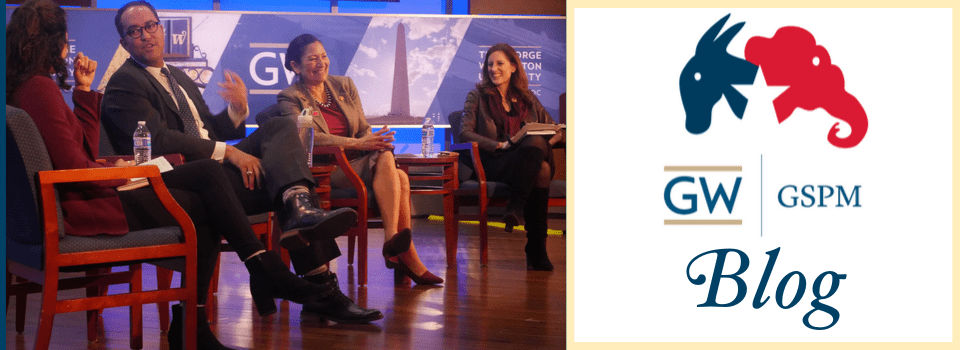Like so many chance encounters in this day and age, the story of Nikki Jedlicka and Ellesse Krall began with a Facebook post. Nikki was looking for a job. Ellesse had a job to offer. But Nikki did not know Ellesse, and Ellesse did not know Nikki. Thousands of miles separated the two women, but one bond tied them together. They were both graduates of the GSPM Strategic Public Relations program, and that was enough.
Nikki was looking for a job because she was about to move to Washington, DC, from California, not long after moving to California from Okinawa, Japan. Nikki’s husband is a U.S. Marine, and Nikki herself grew up a military brat, so she was used to crisscrossing the globe at the behest of the Pentagon. As it turns out, she completed her GSPM Strategic PR degree online in 2016 while living in Japan. Faced with yet another big move, Nikki asked her fellow GSPM graduates to point her in the right direction.
“I started really hitting the ground running with the online networking and GSPM does have that alumni page on Facebook,” Nikki said. “So I introduced myself awkwardly. I’m heading back to the East Coast shortly and I just want to start putting feelers out there for opportunities and meet some people.”
Ellesse, who graduated from GSPM in 2018, had a job to offer because of the drones. More specifically, the Federal Aviation Administration’s drone regulation program. Ellesse is a communications principal at Evans Consulting, of which the FAA is a major client. Although a job opening wasn’t immediately available, Ellesse knew that opportunities at the firm would emerge down the line.
“At Evans, we’re always looking for folks with communication experience because, as our projects and our business continue to grow, there was always that increase in needing communications support,” Ellesse said.
Ellesse came across Nikki’s post on the GSPM alumni Facebook page and the gears quickly began to turn.
“I got a handful of messages, but the most promising was from Ellesse,” Nikki said. “We had some email exchanges, we got to know each other, she told me all about Evans Consulting and just really tried to feel out where my skill sets were and where my interests lie, and we started an interview process as soon as I got to the East Coast.”
“It just lined up perfectly,” Ellesse added. “It took like six months or eight months from the time we first met to the time [Nikki] actually got on board.”
Fast forward to now. Nikki is about to complete her first year at Evans. She still focuses on providing communications and logistical support for the FAA’s drone regulation program, but she also tackles marketing and corporate social responsibility duties outside the FAA sphere. She believes she has found the right fit. She is happy.
“It worked out really well for both of us and I don’t know if I would’ve been so successful without someone in the program to help me,” Nikki said.
Both women are well acquainted with the capabilities of the GSPM and GW networks. Despite having completed her SPR master’s degree online, Nikki had met with SPR program director Larry Parnell and GSPM career director Mag Gottlieb, who connected her with other GSPM graduates at several DC firms. Ellesse remains in close contact with her former classmates and is proud to have helped several GW graduates obtain jobs at Evans.
Now that it is difficult to envision a return to the days of shaking hands, slapping backs, and exchanging business cards at meet-and-greets, Nikki and Ellesse’s story serves as an example of remote networking at its finest. In the era of social distancing, being proactive, reaching out to the right people, and dedicating time to building relationships is essential.
“It sounds cliché at this point but you just have to participate and be willing to spend time on your computer and get on the phone and do the webinars and the happy hours,” Nikki said. “I hate to frame it as trying to stay relevant but that’s really the only way to do it since we do lack that in-person piece and we do need to stay in communication.”
Nikki did not know Ellesse, and Ellesse did not know Nikki. What they did know were the skills and experiences they acquired at GSPM. They knew the work ethic, the focus, and the commitment necessary to succeed at GSPM. This knowledge cultivated an implicit trust between two strangers and led both of them to take a leap of faith that ultimately paid off.
“I knew the skills she already had just based on her being a GW alum,” Ellesse said. “That’s the great thing about the network. We already know your background. We already know you can do the job.”

